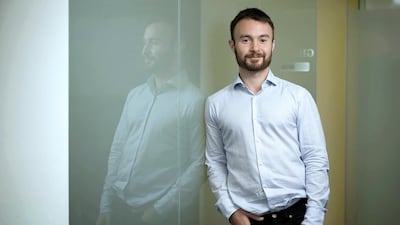Hassan Al Damluji sums up the philosophy of the Bill and Melinda Gates Foundation like this: “Our bottom line is to do good in the world.”
It is a neat way of expressing the alliance between big business – the “bottom line” beloved of billionaires everywhere – and philanthropy. The founder of Microsoft and his wife have brought a new professionalism and commercial awareness to the world of “charity” in the 15 years since the foundation was launched.
For the past three years, it has turned its attention to the Middle East and the Muslim world, and Mr Damluji is the person they chose to lead the drive into the region. At 32 years old, he combines altruism, business awareness and the new hard-nosed financial approach to regional philanthropy. “Young people want to do good, but you also have to make a living,” he says.
Mr Al Damluji’s family origins lie in the northern Iraqi city of Mosul, but his family came to Britain in the 1970s when his father met and married the Irish woman who became Hassan’s mother. “It’s an unusual combination, I know. Maybe that accounts for whatever creativity I have,” he says.
Studying Arabic and Middle East studies at the University of Oxford and later at Harvard University in America taught him a lot about the region, but also reinforced a big realisation: “I saw that my cousins in Iraq had a much harder life than me,” he says.
Having garnered some experience working in journalism in Britain, and a growing conviction that education could help to solve many of the problems of the region, Mr Al Damluji moved to Dubai to work for the consulting firm McKinsey and Company on education projects in Saudi Arabia, Yemen and Pakistan.
He was perfectly placed when the Gates Foundation came knocking in 2012 in its initiative to expand its philanthropic work into the Middle East, and the capital-rich Arabian Gulf in particular.
“The foundation had previously been focused on the absolute poverty of Africa and Asia, rather than the Muslim world. But of course there is poverty in the Middle East as well, in Yemen and Egypt for example, and there are other problems, notably in health care, in other parts of the region,” he says.
One of the foundation’s most high-profile projects was the Global Alliance for Vaccines and Immunisation (Gavi). It was launched in 2000 to improve access to modern vaccination programmes, mainly for children, in the world’s poorest countries, to combat diseases such as polio, malaria and tuberculosis.
Gavi had achieved notable success in parts of Asia and Africa, but in some parts of the Muslim world it had encountered a cultural resistance to western medical techniques. Joining hands with the Arabian Gulf states was considered a particularly important alliance. “In this part of the world, a sheikh’s voice carries more weight than Bill Gates’s. Islamic scholars from the UAE worked in Pakistan to change the thinking in some parts there,” says Mr Damluji.
A particularly strong partnership was struck with the UAE. The government of Abu Dhabi joined hands with the foundation to fund an immunisation programme against polio, which struck down thousands of children in the Muslim world – especially in Pakistan and other parts of Asia and Africa – for want of cheap and accessible immunisation. “We reframed the fight against polio as a Muslim fight, and there has been a great change,” says Mr Damluji. “Now northern Nigeria is off the list of endemic areas for the disease, and next year may be the first year when there are no new cases of polio in the world.”
That will be a great achievement for the campaign launched under a directive from Sheikh Khalifa, President of the UAE, and funded by Emirati philanthropy.
That is part of a steady increase in the Middle East’s importance to global charitable funding. The Gates Foundation spends around $5 billion a year on philanthropic grants. The UAE alone spends slightly more than this per annum in foreign aid, and total foreign aid spend from the entire Gulf is more than twice that figure.
Other projects have also been launched as part of the foundation’s greater focus on the Muslim world. The $500 million Lives and Livelihood Fund launched last summer in collaboration with the Islamic Development Bank (IDB) will make Sharia-compliant finance available for projects in health care, smallholder agriculture, basic agriculture, and refugee care, or “just about every global and health development issue important to the foundation”, says Mr Damluji.
Mr Gates has put in $100m with another $100m from the IDB, enough to get the project started. An additional $2bn of funding over the next five years will come from contributions, with UAE and other Arabian Gulf donors expected to figure prominently.
“People are looking at ways of addressing problems across the Muslim world in a collaborative way, and this is a cost-effective way to do it,” Mr Damluji says. “It is cheap capital to help the world’s poor move towards owning their own development. It is not focused on security, but sensible people are realising there is a connection. The Gulf is part of the solution to the region’s problems, and is already generating jobs and creating development.”
The financial sophistication of the new fund is symptomatic of the new belief in “venture philanthropy”, sometimes called “philanthrocapitalism”.
For Mr Damluji, that is undoubtedly a good thing. “Most of my colleagues are former consultants, even bankers. There is certainly a trend towards more professionalism, and donors want to see more visible returns,” he says.
He points to a very visible outcome from the vaccination campaign. “We believe Gavi has saved between 6 million and 7 million people’s lives. That’s roughly the population of the UAE that has been saved from death by disease. That is a real return,” he adds, proudly.
fkane@thenational.ae
Follow The National's Business section on Twitter

